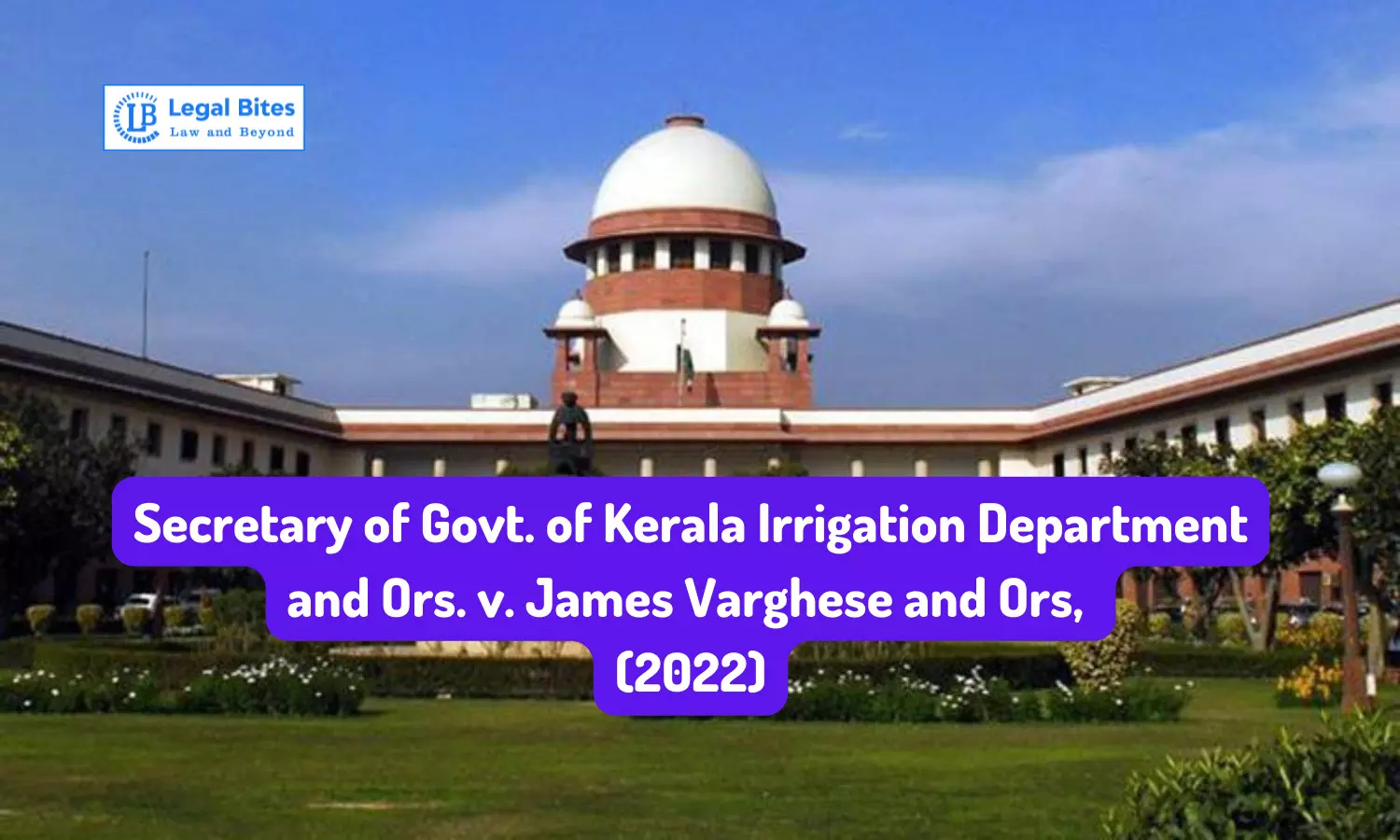Case Summary: Secretary of Govt. of Kerala Irrigation Department and Ors. v. James Varghese and Ors, (2022) | Constitutional validity of the Kerala Revocation of Arbitration Clauses and Reopening of Awards Act, 1998
The 'Case Summary: 'Secretary of Govt. of Kerala Irrigation Department and Ors. v. James Varghese and Ors' by Snehil Sharma contains one of the landmark judgments passed by the Hon'ble Supreme Court of India.

The 'Case Summary: 'Secretary of Govt. of Kerala Irrigation Department and Ors. v. James Varghese and Ors' by Snehil Sharma contains one of the landmark judgments passed by the Hon'ble Supreme Court of India. The issues involved in the case relating to legislative competency and legislative authority of the state will be discussed in this case summary and the judgment passed will be duly analyzed.
The Supreme Court of India recently declared the Kerala Revocation of Arbitration Clauses and Reopening of Awards Act, 1998, to be unconstitutional and held that it violated the idea of the separation of powers and transgressed the judicial functions of the State by having the effect of nullifying awards that have become Rules of Court. The appeal brought forth by the State of Kerala was dismissed by a bench comprising Justices L Nageswara Rao and BR Gavai.
Court: Supreme Court of India
Bench: Justice L. Nageswara Rao, Justice B.R. Gavai
Citation: Civil Appeal No. 6258 OF 2014
Date of Judgment: 4th May 2022
Facts of the Case
The Facts of the case are as follows:
- The construction of the Kallada Irrigation Project was initiated by the Kerala government in the year 1961. From June 1982 to March 1989, the World Bank provided the Kerala government with financial support for this project.
- The agreements pertaining to the works associated with the Kallada Irrigation Project included a particular condition, known as the local competitive bidding specification (LCBS), as mandated by the world bank. The local competitive bidding specification (LCBS) clauses 51 and 52 prescribed arbitration of any disputes or disagreements. The same was availed in order to facilitate quick and equitable resolution of any differences or disputed issues. It was required to include an arbitration clause in it.
- Along with disagreements and disputes, this arbitration clause was also creating unnecessary hurdles for the Kerala government's operations. They did not get the intended outcome because many arbitrators, working in concert with the claimant, unilaterally and incorrectly awarded outrageous sums of money that violated contracts' terms and were not supported by any evidence.
- As a consequence, to this, the Kerala government brought forward The Kerala Revocation of Arbitration Clauses and Reopening of Awards Act, 1998, giving due regard to the public interest. The act came into effect on 14th November of the year 1997. The focal view of this act was to go beyond the arbitration clause in order to prevent the binding nature of the clause. When this act got passed, numerous petitions were filed alleging arbitrariness before the Kerala High Court.
- The High Court of Kerala struck down the Act on two grounds: first, that it exceeded the legislative authority of the Kerala state legislature and was therefore unconstitutional; second, that it had the effect of nullifying arbitrator awards as well as judicial judgments and decrees.
- As a result, it was determined that the Act encroaches upon the judicial authority. Highly aggrieved by this decision of the Kerala High Court, the appeal was filed by the state government before the Supreme Court of India.
Issues Involved
There were two issues that were raised in this case are as follows:
1) Was the Kerala Revocation of Arbitration Clauses and Reopening of Awards Statute, 1998 (state act), enacted by the Kerala government within its legislative competency? Does it fall under the provisions of Article 254 of The Constitution of India?
2) Whether the Kerala Revocation of Arbitration Clauses and Reopening of Awards Statute, 1998 impinge upon the judicial authority of the state?
Laws Applied
The laws which were majorly applied and interpreted in this case are:
Article 254 of The Constitution of India, for determining the constitutionality of Kerala Revocation of Arbitration Clauses and Reopening of Awards Statute, 1998
Entry 13 of List III of the Seventh Schedule of the Constitution of India, for the purpose of determining the competence of the State Legislature.
Section 89 of The Code of Civil Procedure, 1908, which provides the definition of Alternative Dispute Resolution (ADR). It was contended by one of the parties that such removal of the arbitration clause will eventually be considered against the judiciary.
Judgment
The Hon'ble Supreme Court passed the judgment on this case on May 4, 2022, where it agreed with the judgment of the Kerala High Court on one part while also disagreeing with the same on the other part. This can be perceived by segregating the judgment based on the issues involved.
Issue 1
While discussing the legislative competency of the Kerala government, the Supreme Court disagreed with the High Court's position on this issue because it was of the view that the state legislature had the authority to introduce the Act. The Supreme Court referred cases such as G.C. Kanungo v. State of Orissa and Madhya Pradesh Rural Road Development Authority & Anr. v. L.G. Chaudhary Engineers & Contractors where Entry 13 of the Concurrent List was held to be dealing with arbitration. Both cases pointed out that the state is entitled to legislate upon the subject relating to arbitration if it has duly received the assent of the President.
The Supreme Court further stated that under Article 254(1) of the Constitution, the Central laws will take precedence over state laws in situations where they are in conflict. However, when the state law has duly received the President's assent, it would take precedence under Article 254 (2) of the Indian Constitution. The doctrine of pith and substance was prescribed to ascertain the actual character of legislation in cases where there is an overlap between the entries.
The Court after interpreting the Statement of Objects and Reasons of the 1996 Act along with the resolution of the United Nations General Assembly regarding Model law on ICA (International Commercial Arbitration) came to the conclusion that the 1996 Act was not intended to implement the decision of an international conference in terms of Article 253. Rather, It was enacted based on a resolution that the UNCITRAL Model Law shall be adopted. Therefore, Article 253 does not endure to the benefit of the 1996 Act as per the Court.
These considerations led the court to the conclusion that the 1998 Act is under the purview of the state legislature's legislative authority.
Issue 2
The Supreme Court then assessed whether the Act annuls arbitrator awards and/or court judgments and decrees and if this amounts to an invasion of the judicial powers of the courts. The Court pointed out that the majority of the Kerala arbitration cases touching the current issue had awards that were made before 1992 and became court rules before 1993. A few appeals under Section 39 of the 1940 Act were still ongoing in court on the day the 1998 Act was passed.
The Kerala state government referred to the G.C Kanungo case, wherein the Supreme Court had held that decrees passed by the courts in order to make any award 'rule of court' is done for the sole purpose of enforceability and it shall not be treated as if such judgments and decrees are passed within the exercise of judicial power. However, the Arbitration (Orissa Second Amendment) Act, 1991 was held unconstitutional in this case since it invalidated the awards passed by Special Arbitration Tribunals, which are considered to be passed in the exercise of judicial power.
Furthermore, the court held that legislation cannot be used to overturn judgments and decrees issued by civil courts; only higher courts may do so. In State of Tamil Nadu v. State of Kerala (2014), a five-judge Supreme Court Constitution bench outlined the three-part test for "separation of powers" and held that the 1998 Act, which has the authority to revoke awards that have become "rules of court," infringes upon judicial authority and thus violates the doctrine of separation of powers.
Conclusion
The Supreme Court after interpreting every aspect of the case held that the act which was passed by the Kerala government is constitutional in nature and justified to a great extent giving due regard to the doctrine of pith and substance. However, if any order is passed with an intent to surpass the arbitration clause, then it will be considered to narrow the power of the judiciary. It will be restricting the powers vested with the judiciary and will be against the doctrine of separation of power. Hence, the bench comprising of L.Nageswara Rao and B.R. Gavai held the act to be unconstitutional and dismissed the same.
Important Links
Law Library: Notes and Study Material for LLB, LLM, Judiciary, and Entrance Exams

